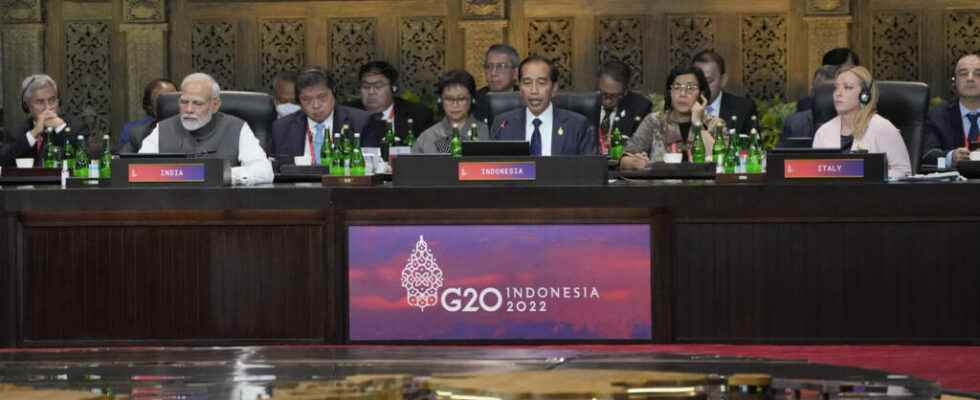The leaders of the G20 and their partners are meeting this November 15 for a summit at the bedside of a world economy in crisis, in Bali, Indonesia, which is chairing the G20 this year. Although the war in Ukraine is not officially on the agenda of this summit, it will undeniably be at the heart of the debates.
From our special correspondent in Bali,
It should be noted that the G20 is above all a forum for economic cooperation which brings together rich countries and the major emerging economies, i.e. two thirds of the world’s population. Countries that alone account for 80% of the wealth produced in the world and represent 75% of international trade. The G20 is not intended to manage peace and security issues, that is the role of an organization like the UN, but rather to respond to economic crises, but this year they are the direct consequence of the war in Ukraine.
The situation is all the more complex as Russia, a member of the G20, is the aggressor. Russia, which is therefore largely responsible for the state of the world economy at the bedside of which the G20 is meeting on November 15 and 16.
► To read also: G20: Macron calls on China to “unite” against the war in Ukraine
An economy facing several crises
The world has had no time to recover from the pandemic that it is once again threatened with an economic recession. And the first of the concerns of the G20 in Bali is food insecurity, which is hitting the countries of the South hard, which are more vulnerable to grain supply problems. It should be remembered that Russia and Ukraine are among the world’s leading producers of barley, corn and sunflower, to take just a few examples, and the war launched on February 24 by Vladimir Putin has completely destabilized these markets, making them considerably more expensive the prices of these agricultural raw materials. This has fueled an inflation that now spares no country.
To respond to this food crisis, an agreement was signed under the aegis of the United Nations to allow Ukraine to export its cereals, but it is now threatened by Moscow, which refuses to renew it beyond the 19 November, that is to say by the end of the week.
These are the problems that the G20 must address as a matter of priority.
But food insecurity is just one crisis among many. There is the burning issue of energy, the financial crisis that threatens with the debt problems that more and more countries are facing, and of course the climate on which we expect a strong position from the G20. The success of the negotiations of COP27 taking place right now in Sharm el-Sheikh.
► To read also: Before the G20, Joe Biden and Xi Jinping plead for an easing of Sino-American relations
A great absentee, Vladimir Putin
The Russian president announced a few days before the start of the summit that he would not be going to Bali. He is represented there by his faithful head of diplomacy Sergei Lavrov who will use all his weight to avoid condemnation of his country. Because you should know that although responsible for the crises that are currently shaking the world economy, Russia can count on support from the G20. China, for example, which until now has still not condemned the invasion of Ukraine. Or India, which continues to trade with Moscow, despite Western sanctions. Finally, another major support from Russia, Saudi Arabia, which notably rallied to Moscow’s positions within OPEC+ at the origin of the surge in oil prices and the resulting energy crisis.
The equation is therefore not simple for the Indonesian presidency of the G20, one of whose priorities will be to prevent this summit from spreading the divisions of the world. The very credibility of the G20 is at stake.
